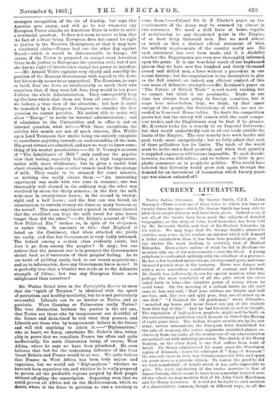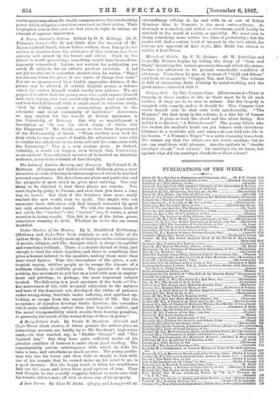CURRENT LITERATURE.
Twelve Indian Statesmen. By George Smith, C.I.E. (John Murray.)—There is not one of these Lives to which ten times or twenty times the space which Dr. George Smith has been able to allot them might not very well have been given. Indeed most, if not all, of the twelve have been made the subjects of detailed biographies, as the story of John, Lord Lawrence, has been told by Mr. Bosworth Smith, and that of Sir Herbert Edwardes by his widow. We may hope that Dr. George Smith's admirable sketches may rouse in his readers an interest which will demand a fuller satisfaction than it has been here possible to give. Of the twelve the most striking is certainly that of Herbert Edwardes. Even a bare outline of what he did in Mooltan—to mention only one of his achievements—stirs the blood. A young subaltern is confronted suddenly with the rebellion of a province. He has a few hundred native troops, twenty camel guns, and some thousand pounds or so in the treasury. Never was danger met with a more marvellous combination of courage and wisdom. Dr. Smith has judiciously chosen for special mention what was perhaps the most wonderful of all the gifts which the crisis called forth in him,—the intuitive power of seeing whom he could trust. On the morning of a critical battle an old chief came to him and said, "Half your soldiers are friends and half are foes, and, like rice and split peas, they are all mixed up in one dish." "I thanked the old gentleman," wrote Edwardes, "mounted my horse, and never found out any of the traitors from that day to this." And he had foresight as well as insight. The reputation of half -a-dozen prophets might well be built on the extraordinary prediction which he made in 1849 of the Mutiny. of eight years later. The Indian Empire overthrown by its own army, unwise annexations, the European force diminished for the sake of economy, the native regiments recruited almost ex- clusively from one caste, all the weaknesses of our administration are pointed out with unfailing precision. The sketch of Sir Henry Ramsay, on the other hand, is one that suffers from want of detail. Sir Henry administered for many years the Himalayan region of Rumaon,—hence his sobriquet of "King of Kumaon." He was sent there in l856, was Commissioner till 1884, and spent six years more as a private citizen. To realise the good he did we want a multitude of details which it was quite impossible to give. The least satisfactory of the twelve memoirs is that of James Outram, which seems to have been somewhat hurried over. Of the others we may mention that of Dr. John Clark Marshman and Sir Henry Lawrence. It would not be right to omit mention of a characteristic common, though in different ways, to all the
twelve great men whom Dr. Smith commemorates, the constraining power which religious conviction exercised on their action. Their biographer sees in this, and, we feel sure, is right in seeing, an element of supreme importance.























































 Previous page
Previous page